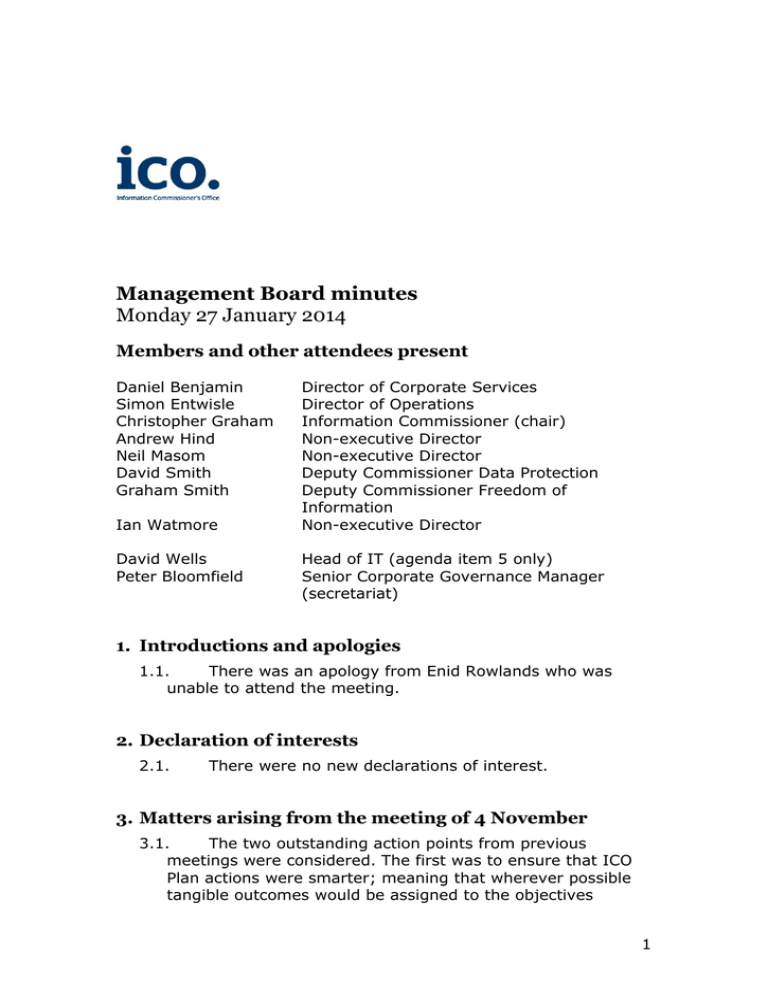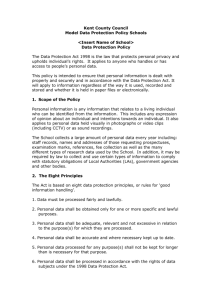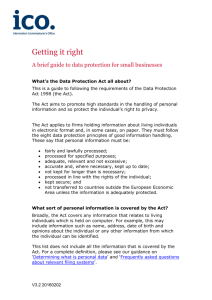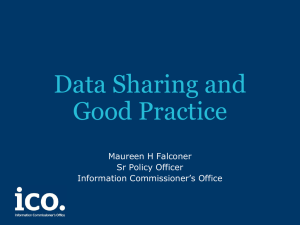Minutes of this meeting PDF
advertisement

Management Board minutes Monday 27 January 2014 Members and other attendees present Daniel Benjamin Simon Entwisle Christopher Graham Andrew Hind Neil Masom David Smith Graham Smith Ian Watmore David Wells Peter Bloomfield Director of Corporate Services Director of Operations Information Commissioner (chair) Non-executive Director Non-executive Director Deputy Commissioner Data Protection Deputy Commissioner Freedom of Information Non-executive Director Head of IT (agenda item 5 only) Senior Corporate Governance Manager (secretariat) 1. Introductions and apologies 1.1. There was an apology from Enid Rowlands who was unable to attend the meeting. 2. Declaration of interests 2.1. There were no new declarations of interest. 3. Matters arising from the meeting of 4 November 3.1. The two outstanding action points from previous meetings were considered. The first was to ensure that ICO Plan actions were smarter; meaning that wherever possible tangible outcomes would be assigned to the objectives 1 concerned. The draft ICO Plan was to be discussed later in the meeting. 3.2. The second was to consider how best to identify efficiencies in data protection work. Simon Entwisle advised the Board that work was ongoing. For example, as part of talks about an information rights fee, how best to cost various ICO activities had been discussed with the Ministry of Justice (MOJ). Areas looked at had included the cost of ICO prosecutions which had a wide range. And it was expected that the cost per freedom of information case would reduce. Action point 1: Simon Entwisle to bring a paper on data protection costs based on 2013/14 figures to the next Management Board meeting. 3.3. Clarification was sought on the cleared action, to discuss with the National Audit Office (NAO) whether or not civil monetary penalties paid to the ICO could be offset against costs of collection. The NAO had confirmed that they could not be; legislation was such that all of the money collected had to go to the consolidated fund. 3.4. The new format for the outstanding action points was liked. Action point 2: Peter Bloomfield to include Remuneration Committee actions in the register of outstanding action points. 4. Commissioner’s forward look and the risk register 4.1. The Commissioner reported on major issues affecting the ICO. Matters raised included the ongoing consultation on the ICO’s high level statement of travel “Looking ahead, staying ahead” which closes on 7 February. A Town Hall meeting with all staff was arranged for the week afterwards to feed back on the 2020 vision work started last year. 4.2. The Commissioner also reported back on his recent meeting with Simon Hughes MP, the new Minister of State for Justice and Civil Liberties. The Minister had agreed to be a key note speaker at the forthcoming Data Protection Practitioners’ Conference in March and would like to visit the Wilmslow office at some point. There was a need for the ICO to be clear about (and to discuss) any legislative changes it wanted. 4.3. ICO accommodation and the factors which would have an impact on decisions were discussed. These included recruitment and the affect on current staff from any move. 2 4.4. The rollout of care.data was one of the big issues in which the ICO was involved in. However it was noted that the Data Protection Act was not the main governing legislation steering how the project was handled. Other specific legislation about the project existed. This meant the ICO had to be clear about its role and remit when making statements on the project. The main concern was that patient data might not be fully anonymised. 4.5. Criteria had been developed to help inform decisions on ICO involvement in different projects and areas. The criteria were considered useful. In respect of affordability, whilst it was desirable to have funding for new work this might not necessarily be the deciding factor in all cases. Coherence with the work of the ICO (or proximity to and consistency with) were also important. Action point 3: ET to finalise the paper “Our Approach to Additional Regulatory Functions” and to build in a 12 month review. 4.6. The risk register was considered. It was noted that the register was static and needed a re-fresh once the ICO Plan 2014-2017 was agreed; ie in March. In respect of the European Regulation, given the low probability of the proposed Regulation now coming into being it was felt that it was unlikely that there would be any changes to the European data protection legislative framework until 2018 at the earliest. Action point 4: Peter Bloomfield to ensure that ET reviews the risk register in light of the developing plans for 2014/15 and beyond, by the end of March. 5. IT Strategy 5.1. David Wells, Head of IT, attended to present the IT Strategy. It was a slightly amended version of the one presented to the last Audit Committee. The need to tie the strategy into business need had been taken on board and Simon Entwisle confirmed that operational need was supported. 5.2. Recruitment in IT was a problem; there was a shortage of specialist staff which drove the cost up. 5.3. It was difficult at present to compare costs year on year given the change in the way IT was being run. However increasingly information on costs was improving. In particular it was noted that much of the costs in the IT budget related 3 to expenditure which would not normally be considered as IT expenditure. 5.4. The cost of providing IT for the ICO was large at £4m. It was suggested that the ICO had to be sure it was getting value for money from its IT expenditure and had also thought through what it could provide on more, or less, money. Linking IT expenditure to efficiencies was thought essential. 5.5. The need to ensure that the reasons why the ICO could not source a cloud based finance system also had be clarified. Action point 5: Daniel Benjamin to finalise the IT strategy taking account of the comments made, by the end of March. Action point 6: Daniel Benjamin to look at the impact of a rise, or fall, in IT budget, by the end of March. 6. Planning and budgeting 6.1. The draft budget for 2014/15 was presented for discussion. Grant in aid (for freedom of information work) was yet to be confirmed but was expected to be £3.75m. The budget was therefore not expected to change substantially. 6.2. Funding for 2015/16 was more uncertain and the MOJ was being asked for clarity on the plans for a proposed cut in regulators’ fees in 2015 and for increases in employer pension contributions. The lack of flexibility for the ICO to meet further cuts was noted. 6.3. The ICO was to approach the MOJ for funding to support the Commissioner if elected to the chair of the Article 29 Working Party. 6.4. In respect of the draft ICO Plan 2014 – 2017, this would be firmed up in the next few weeks once the results of the consultation exercise on the ICO’s high level direction statement closed. 6.5. It was agreed that ET would consider the wording of its “goal” when the consultation closed. There was also discussion about the aim to answer telephone calls to its helpline within one minute. The resource needed to improve this time would be disproportionate to the improvement in service, and customer surveys had not suggested that the wait was a big problem. 6.6. Succession planning was noted as being an important strand of work that needed to be seen through over the next 12-18 months and it was agreed that this should be reflected 4 in the Plan. This would cover not only the implications of the Commissioner reaching the end of his term in 2016 but also likely changes among Board members in the medium term. 7. Management Board self assessment and changes to other committees’ terms of reference 7.1. The terms of reference for the Remuneration Committee were considered in detail. It was felt to be the least visible and understood of the ICO committees. It meets twice a year and its minutes come to Management Board. However, it was thought that it would be beneficial if other Board colleagues attend Remuneration Committee meetings from time to time to build a broader understanding of the issues it covers and its role. Action point 7: Christopher Graham to discuss with colleagues how to develop a greater understanding of the Remuneration Committee’s work; and to report back to the next Management Board. 7.2. It was agreed not to change the wording of the Remuneration Committee’s purpose in its terms of reference. It was felt that doing so was not necessary given the more detailed sections in the terms of reference. 7.3. It was agreed to amend para 2.5.13 to say that the committee shall “Consider any other relevant matters as raised by the Commissioner”; but not to include the Commissioner as a member. Rather it was confirmed that the role of the Committee is to advise the Commissioner. 7.4. Two minor changes to the ET terms of reference were also agreed. These were to reflect the replacement of the Statement on Internal Control in the annual report by a Governance Statement, and to add “Staff leadership and development” to its (and Management Board’s) responsibilities. 7.5. Finally minor amendments (one noted above) were agreed to the Management Board terms of reference. Action point 8: Peter Bloomfield to revise the terms of reference as agreed by 31 January. 8. Governance Statement 8.1. Peter Bloomfield tabled a draft template for the Governance Statement which was to be included as part of the ICO’s Annual Report. It was tabled to ensure that Board 5 members knew about the statement and the proposed format for it. 9. Performance against the ICO Plan 2013-2016 9.1. The report on performance against the current ICO Plan was presented for information and discussion. Discussion focused on those areas with slippage. 9.2. It was confirmed that it was still the intention to develop information rights training material for use by organisations when training their own staff; the project was however delayed due to resourcing problems and would now be completed by March 2015. 9.3. Due to a lack of resources little had been done on promoting freedom of information to the public. 9.4. The ICO was still pressing for changes to its funding model. The possible completion date had slipped from March to May 2014. 10. Finances 10.1. The income and expenditure report for December was presented for information and discussion. The ICO was in a reasonably good position this financial year as data protection fee income had recovered from its earlier drop. 10.2. The departure of the Finance Manager to a new job was noted. An interim manager had been recruited pending an exercise to recruit a permanent Finance Manager. 10.3. It was also noted that there had been a failure to recruit for the post of Head of People and Resources. ET was to reconsider the position. 11. Issues reports 11.1. Reports on Operations, information rights, Corporate Affairs, Organisational Development and IT areas were presented for information and discussion. 11.2. In respect of Operations staffing levels had been stable over the year which had helped increases in productivity to meet increases in caseload. Project Eagle, looking at how data protection cases were assessed, was on track with roll out planned for April. 6 11.3. In respect of Organisational Development it was reported that staff turnover for the ICO as a whole was up to (an extrapolated annual figure of) 10.5% 12. Executive Team reports 12.1. The minutes of ET meetings since the last Management Board were presented for information. 13. Remuneration Committee 13.1. The minutes of the last Remuneration Committee were presented for information. 14. Audit Committee 14.1. The minutes of the last Audit Committee were presented for information. 14.2. Neil Masom, the chair of the Audit Committee, reported that in a private session at the last meeting the Committee had considered the recommendation to re-appoint Grant Thornton as the ICO’s internal auditors and had confirmed the appointment. When in private session the Committee had also considered the review of Corporate Services and a HR issue. Management had reviewed policies as a consequence of discussion at the session. 15. Any other urgent business 15.1. Christopher Graham confirmed that he had met with the non-executive director designate who was due to start in the role in August. 7


